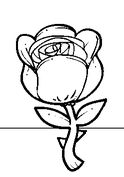
Chapter 17
How Do You Get to Carnegie Hall?: Revision, Revision, Revision
In This Chapter
➤ Why revise?
➤ Killing your darlings
➤ Letting your poems rest
➤ How not to revise the “life” out of your poems
➤ When a poem dies—poetry funeral?
Unless you’re a poet of the Beat Generation (which in all likelihood you’re not), who lived by the motto “first thought, best thought,” revision is not a matter of choice—you have to revise if you want to be a serious writer.
Revision is the most important thing you can do as a writer. A poet who won’t revise does his or her poems a grand disservice. Even if you use every single poetic skill to perfection, you may as well toss all your poems in the trash if you’re unwilling to rework them to make sure they are in the best possible shape they can be. Your first thought is generally not your best thought, but you can rework your thoughts and make them even better. In this chapter, we’ll discuss the best approach to revision.
Revise Away!
Revision means re-seeing your poems (hence the root word, “vision”); it entails asking your poems how they can be improved and listening for the answer. Once you’ve written a poem, it has a life of its own; you’re in service to it, not the other way around. If you force your poem to be something it’s unwilling to be, the opposition could be deadly—for the poem! Be kind to your poems. Give them the chance to improve! Revision is not about running spell-check, fixing punctuation, or changing a word or two—it’s about seeing your poem objectively and changing it significantly enough to make it “work.”

Dodging Doggerel
If you truly want your poems to be good (or better than they have been in the past), consider doing quite a lot of revision on them if they need it. Look at them keeping all the poetic conventions in mind. Ask yourself: How can I make this poem better?

Let Me Count the Ways
Revision is one of the most important gifts you can give your poems. Some poems seem to come from a divinely inspired source, and may not need a lot of revision, while others will need a total overhaul. Great writers revise.
For example, if you’ve written a metrical rhyming poem and something just isn’t right, you have to be willing to take it out of meter and ditch the rhyme to make the poem better. If you’re married to the meter and the rhyme, you might be missing out on a way to make your poem far better than its original form.
Murdering Your Darlings
The novelist William Faulkner said to “murder your darlings.” He did not mean that killing your loved ones will make your writing better; he meant that you shouldn’t become so attached to something in your work that you can’t cut it out to make your work better. That’s not so strange a theory as it sounds.
This sounds cruel, doesn’t it? Take a look at a lovely poetic line of yours—does it really belong there? Does it add something important to the poem? Why do you love it so much? Is it the only line holding an otherwise poor poem together? Why have you been reluctant to remove it, or to use it somewhere else?
The wonderful thing about revision is that you don’t have to really “kill” your lines—you can simply “retire” them for a while and use them somewhere else. Good lines of poetry never die—they get reborn in other poems.
Why Revise?
You revise to make your poem better. A careful poet makes sure that every word is in the “proper” place, that everything in the poem has meaning, and that the poet’s intention was revealed. You’re a careful poet. You revise.
Your first thoughts in your first draft may not be as polished as your second thoughts, and those will not be as tight as the images and ideas in your third. Keep working a poem until you can’t look at it objectively anymore. Then show it to someone else. Then revise again. Revision will help you avoid writing doggerel—poems only fit to be fed to the dog!
What About Inspiration?
Okay, don’t whine. Inspiration is great, but not all inspiration is created equal. If you can’t begin to think of poetry as a real art with real work involved, you’re going to miss a large part of what it means to be a poet.
The words that come to you when you’re writing poetry do come from somewhere, but I can’t tell you from where. Perhaps it’s different for each of us. I do sometimes think that some of my poems are the product of some kind of divine inspiration or fortune, but that doesn’t mean that they are sacred relics. They, too, need polishing, just as a rare coin does when it’s brought up from a shipwreck. If you’re lucky enough to find the coin in the first place, don’t you have the obligation to shine it up?
Letting a Poem “Rest”

Poetically Correct
Doggerel is hackneyed, trivial or bad poetry, usually using a monotonous rhythm and rhyming pattern.

Touchstones
Some poets actually say they don’t revise and don’t believe in revising. They say their originality suffers. I don’t see that at all. The words that come first are anybody’s, a froth of phrases, like the first words from a medium’s mouth. You have to make them your own.
—James Merrill
Sometimes poems need to rest a bit before you revise them. They are tired from being wrought so fiercely, and they just want to be left alone.
Allowing yourself to gain some distance from a poem is a great way to begin to see it objectively. When a poem is fresh, a poet may not be able to see its weaknesses. Put the poem in a drawer for a while and forget about it. In a week, a month, or even a year, drag the poem out and see what you can do with it. Chances are you’ve become a better poet in the meantime (if you’ve been practicing) and will be better able to use your poetic skills on it. Trying to revise it too soon can lead to frustration. You’ll get better at revision the more you do it.
When Good Poems Go Bad: The Quick Fix
If you’re “hot” to revise your poems right away, here are a few quick-fix tips you can try:
➤ Try breaking the lines differently. Doing so may help you find the place where the poem took a wrong turn.
➤ Try writing the poem without your initial strategic skills, such as its rhyme, meter, or repetition, and see if it gets better.
➤ Eliminate all clichés—unless you’ve used them for a reason or in some unique way.
➤ Try to eliminate all TO BE verbs.
➤ Eliminate most or all adverbs.
➤ Question every adjective. A good exercise is to eliminate half of them and see what that does to your poem.
➤ Try different stanza or line lengths.
➤ Reorganize your poem entirely—try changing the order of the stanzas. Perhaps the last stanza would be great as the first stanza.
Enough Is Just Enough
Sometimes revision can revise the life out of a poem. If you revise a poem too much, you can actually make it worse.
How do you know when it’s time to stop revising? Well, you really don’t. Some poets will revise poems even after they’ve been published in book form for years. A poet is rarely completely satisfied with his or her work.
I’ve heard criticism of poets who “love their work too much.” I think this is unfair—it’s okay to love your work, but it’s not okay to be so self-satisfied that you stop putting in the effort to perfect the eternally imperfect. That’s the big mystique of poetry that keeps poets coming back for more. Poetry is not something you’ll ever perfect; the key is all in the trying.
No such thing as a perfect poem exists. Since that’s the case, there’s no real time to stop revising. However, here are some signs that you should leave a poem alone and move on:
➤ You become obsessed with one poem to the point of neglecting other poems or stopping writing until the revision is “done.”
➤ The poem gets published in a very high-quality literary magazine. This doesn’t mean that you can’t revise it again, but it means that you might want to move on to new work. Publication is a nice reward for a well-crafted poem—now make that published poem some brothers and sisters.
➤ Your workshop leader, workshop, 174 editors, your significant other, and your mother hate every revision you’ve done on this single poem in the past 12 years. Let this one rest a bit and write other poems.
➤ Every new draft of a poem makes it worse and worse. Put this poem aside for a while and come back to it later.
What Does Your Poem Want to Be When It Grows Up?
Another thing to keep in mind is that sometimes poems have minds of their own. You want your poem to be a haiku but the poem wants to be a villanelle. So let it. Do what the poem wants. If you set out to write one type of poem, and in revision the poem begins to find another form, let the poem take that form instead. Better to write a good unintended poem than a bad forced poem.
The Theory That You’ll Keep Getting Better
I’m here to tell you that if you practice a lot, read reams of great poetry, and don’t become too self-satisfied with your work, you WILL get better at writing poems.
This is a great theory, because it means that you’ll be able to help your first attempts to be better poems. As you learn to write, you’ll learn to revise, too. Poems that you once felt were helpless may become your best work. Don’t scrap anything—but don’t get stuck either.

Roses Are Red
It’s a good idea to keep drafts of your work. This way you have a “study” of what you did during the revision process so that you won’t forget how you accomplished a certain move. Buy a portable file cabinet where you can easily stuff your drafts. You may have to buy more of these as the years go on, or upgrade to a larger version, but you’ll be glad that you’ve kept all the versions of your work.
The Death of a Poem
There’s something to be said for letting a poem you love slip into the ether, never to be seen again. Every poet I know has hundreds of good poems that will never see publication—or even see one other reader. Sometimes even a good poem is just a practice poem. What you’re striving for are great poems.

Roses Are Red
Keep a file (either a computer file or paper file) with all of your “dead” poems in it—poems that you’re not going to revise any further and are not going to send out for publication or use in a manuscript. This is a good place to look when you’re revising another poem and need a line or an image. This is called cannibalizing. Bon appétit!
“Dead” poems can be fun to come back to years later and revise, or just to study. As you write, you will see yourself improve, and it’s fun to go back and look at your “former poetic self”—it’s a little like looking through an old photo album. You will be charmed by seeing yourself as a “baby.”
The Benefit of Moving On
Getting stuck in the revision process means that you’re not writing anything new. If I had the choice between writing a new poem and revising an old one, I’d choose writing. That way I’d have two poems to revise for the times that I didn’t feel like creating new poems.
When inspiration clobbers you, don’t revise—write! One day, when you’re feeling “dry,” you can drag out all of your creations and revise. Or, you can set aside a certain time each day or each week for revision. Moving on from a group of poems that you’re having trouble revising will help you to create new and potentially better poems.
A Sample Revision
Here is an example of a poem going through a few revision stages. The poet, Maura Stanton, began with handwritten notes that she didn’t save, but she did save the drafts she wrote on her computer. Here they are:
Draft One:
Juxtaposition like a surreal painting
Calling up the comparisons to
Where a photographer
And so the zoo sheltered the wild birds here,
The caption states, and so the zoo herded
Wild birds in here
A hurricane is coming, the caption states,
And so the zoo sheltered the wild birds here
Spreading straw, filling the sinks with water.
But the caption describes a hurricane alert.
Someone’s strewn this tiled floor with fresh straw
And herded these wild, dazed birds through the door.
Still, someone with a camera looked hard, and saw
Something else. This photo was flashed from shore to
shore.
At kiosks, we readers smile at the juxtaposition,
Surprised by an ancient delight in comparisons.
Calling up the comparisons to
Where a photographer
And so the zoo sheltered the wild birds here,
The caption states, and so the zoo herded
Wild birds in here
A hurricane is coming, the caption states,
And so the zoo sheltered the wild birds here
Spreading straw, filling the sinks with water.
But the caption describes a hurricane alert.
Someone’s strewn this tiled floor with fresh straw
And herded these wild, dazed birds through the door.
Still, someone with a camera looked hard, and saw
Something else. This photo was flashed from shore to
shore.
At kiosks, we readers smile at the juxtaposition,
Surprised by an ancient delight in comparisons.
Draft Two:
They look like ballerinas fluffing skirts
To me, I say to a friend. Look at the mirror.
Pleased to make our own delicious comparisons.
Forced to our own strange, dreamy comparisons.
At kiosks we stop, surprised by the juxtaposition,
Pleased to make our own delicious comparisons.
At kiosks we stop, pleased by the juxtapositions,
Encouraged to make our own delicious comparisons.
Teased to make our own delicious comparisons.
Surprised at our own delicious comparisons.
At kiosks, we smile over the juxtaposition
Pleased to make our own delicious comparisons.
Like a corps de ballet fluffing up skirts
And stretching to see themselves in the mirror?
Think up some similes. It’s hurricane alert.
Someone’s strewn this tiled floor with fresh straw
And herded the wild, dazed birds through the door.
And someone else has snapped this photograph
And sailed it straight into every newsroom.
At kiosks we stop, and look, and wonder
Struck by the beauty of all comparisons.
To me, I say to a friend. Look at the mirror.
Pleased to make our own delicious comparisons.
Forced to our own strange, dreamy comparisons.
At kiosks we stop, surprised by the juxtaposition,
Pleased to make our own delicious comparisons.
At kiosks we stop, pleased by the juxtapositions,
Encouraged to make our own delicious comparisons.
Teased to make our own delicious comparisons.
Surprised at our own delicious comparisons.
At kiosks, we smile over the juxtaposition
Pleased to make our own delicious comparisons.
Like a corps de ballet fluffing up skirts
And stretching to see themselves in the mirror?
Think up some similes. It’s hurricane alert.
Someone’s strewn this tiled floor with fresh straw
And herded the wild, dazed birds through the door.
And someone else has snapped this photograph
And sailed it straight into every newsroom.
At kiosks we stop, and look, and wonder
Struck by the beauty of all comparisons.
Draft Three:
Invent to explain this delicious pleasure
Reflected in the
We should be out there locked up in a care
While the birds
That makes this photo funny, one that unites
People and birds, making us all alike
The person and the bird, making them seem
Equal on the earth for the space of a dream.
The person and the bird, leveling both
Or raising them to new levels of growth
People and birds, or is it men and women
Through the mind of the
Reflected in the
We should be out there locked up in a care
While the birds
That makes this photo funny, one that unites
People and birds, making us all alike
The person and the bird, making them seem
Equal on the earth for the space of a dream.
The person and the bird, leveling both
Or raising them to new levels of growth
People and birds, or is it men and women
Through the mind of the
Final Poem:
Pink Flamingoes
Crowded between the stalls and rows of sinks
In the men’s bathroom at the Miami zoo
Three dozen gaudy pink flamingoes shrink
Against each other, a dazzling rendezvous
Of skinny legs, long necks, and feathery stir:
They look like ballerinas up on their toes
Stretching to see themselves in the mirror
Of twirling about to pose for this photo.
The caption explains how a big hurricane
Threatens Florida, but this surreal view
Of public toilets hits us all the same,
Making us grin at something that seems true
And wonderful about the human way,
Though what it is, we really couldn’t say.
Crowded between the stalls and rows of sinks
In the men’s bathroom at the Miami zoo
Three dozen gaudy pink flamingoes shrink
Against each other, a dazzling rendezvous
Of skinny legs, long necks, and feathery stir:
They look like ballerinas up on their toes
Stretching to see themselves in the mirror
Of twirling about to pose for this photo.
The caption explains how a big hurricane
Threatens Florida, but this surreal view
Of public toilets hits us all the same,
Making us grin at something that seems true
And wonderful about the human way,
Though what it is, we really couldn’t say.
—Maura Stanton
While it didn’t begin that way, this poem ended up being a Shakespearean sonnet. As you can see, the poet began with a few images, and even made notes to herself to “think up similes.” You can see here how the poet really worked this poem; she didn’t just turn on her spell-checker. If you keep your drafts, you can evaluate your revision process and see if you’re doing enough to make your poems better, shaping them into what they want to be.
Exercises
Here are some valuable revision exercises to get you thinking about revising your own work.
➤ Have a friend type out several published poems for you without the line breaks. Next, try to see if you can figure out where the line breaks belong. This may help you to get an idea of the line as a unit and will help with your own line breaks.
➤ Take a poem that you’ve recently written and use the “kill your darlings” theory on it: Remove everything you love. What does that do to the poem? Is it better or worse?
➤ Take an antiquated poem and read it several times, to the point where you are positive that you understand the meaning of each line and the meaning of the poem in general. Next, revise it into a modern poem, using your own lines and moves. If the poem takes off on a tangent, let it.
➤ Take the last poem you’ve written and cut it up with scissors so that each line or “idea” is on a scrap of paper. Move the scraps around like you’re working on a puzzle. Perhaps the lines or ideas belong in different places or don’t belong at all. This is a good way to test each little part of your poem. Have a friend put the scraps together the way they see the poem fitting together. If you don’t have a friend, feed the scraps to your dog—all the scraps he doesn’t swallow should go into the poem. Okay, I’m kidding about the dog-as-critic idea! Though you never know … here, Fluffy …
The Least You Need to Know
➤ Revision is not a matter of choice—you must revise your poems.
➤ Revision is about re-seeing your poems, not just running spell-check!
➤ Letting your poems “rest” may enable you to see your work more objectively and will help the revision process.
➤ Sometimes even good poems die. This is part of writing. Let them die with dignity and move on. You can cannibalize them for later poems.
➤ Rather than get stuck in the revision process, move on and write more poems. Then you’ll have more to work on when you’re in the mood to revise.
..................Content has been hidden....................
You can't read the all page of ebook, please click here login for view all page.
